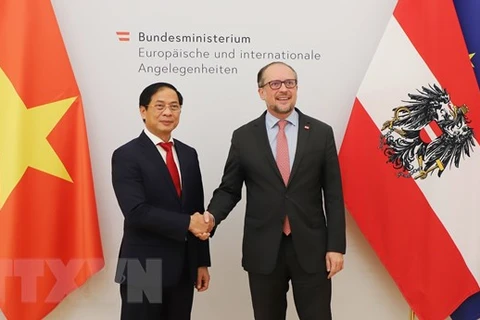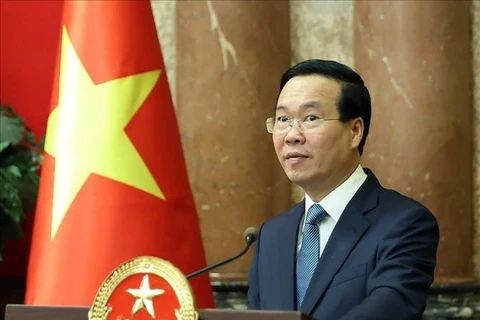Hanoi (VNA) - It is necessary to further step up trade promotion activities and disseminate information to the business community about the benefits of the EU-Vietnam Free Trade Agreement (EVFTA) to take advantage of strengths of both Vietnam and Austria to further boost bilateral trade ties.
The statement was made by Dinh Thi Hoang Yen, First Secretary in charge of trade affairs at the Vietnamese Embassy in Austria, while talking to Vietnam News Agency reporters in Europe on the threshold of President Vo Van Thuong’s official visit to the European country.
According to Yen, trade relations between Vietnam and Austria began in the 1970s, and continuously grew at an average rate of 12% per year from 2007 to 2019 before the COVID-19 outbreak, with the trade balance always tilting towards Vietnam. Two-way trade reached 2.79 billion USD last year, down 0.2% year-on-year.
Austria is currently Vietnam's 7th largest trading partner in the European Union (EU) and 9th in Europe, while Vietnam is Austria's top trading partner in the Association of Southeast Asian Nations (ASEAN).
In the structure of Vietnam's exports to Austria, mobile phones and spare parts account for 80-90% of the value, followed by textiles, footwear, machinery and iron and steel products. Meanwhile, Vietnam mainly imports from Austria machinery and equipment (accounting for 30-40% of the total value), pharmaceutical products, fibers and computer components. In recent years, glass products have become Austria’s strong export to Vietnam.
Yen forecast that in the coming time, potential areas of cooperation between the two countries can be industry 4.0, automobile industry, agricultural industry, environmental industry, green energy, healthcare, forestry and wood processing, construction materials, vocational training and tourism.
Currently, Austria is short of human resources in many fields, especially healthcare. Therefore, the two sides can cooperate on labour in the fields of nursing and information technology to implement the Memorandum of Understanding on Cooperation in E-Commerce and Industry 4.0 signed between the Vietnamese Ministry of Industry and Trade, and the Austrian Ministry for Digital and Economic Affairs, the official added./.
The statement was made by Dinh Thi Hoang Yen, First Secretary in charge of trade affairs at the Vietnamese Embassy in Austria, while talking to Vietnam News Agency reporters in Europe on the threshold of President Vo Van Thuong’s official visit to the European country.
According to Yen, trade relations between Vietnam and Austria began in the 1970s, and continuously grew at an average rate of 12% per year from 2007 to 2019 before the COVID-19 outbreak, with the trade balance always tilting towards Vietnam. Two-way trade reached 2.79 billion USD last year, down 0.2% year-on-year.
Austria is currently Vietnam's 7th largest trading partner in the European Union (EU) and 9th in Europe, while Vietnam is Austria's top trading partner in the Association of Southeast Asian Nations (ASEAN).
In the structure of Vietnam's exports to Austria, mobile phones and spare parts account for 80-90% of the value, followed by textiles, footwear, machinery and iron and steel products. Meanwhile, Vietnam mainly imports from Austria machinery and equipment (accounting for 30-40% of the total value), pharmaceutical products, fibers and computer components. In recent years, glass products have become Austria’s strong export to Vietnam.
Yen forecast that in the coming time, potential areas of cooperation between the two countries can be industry 4.0, automobile industry, agricultural industry, environmental industry, green energy, healthcare, forestry and wood processing, construction materials, vocational training and tourism.
Currently, Austria is short of human resources in many fields, especially healthcare. Therefore, the two sides can cooperate on labour in the fields of nursing and information technology to implement the Memorandum of Understanding on Cooperation in E-Commerce and Industry 4.0 signed between the Vietnamese Ministry of Industry and Trade, and the Austrian Ministry for Digital and Economic Affairs, the official added./.
VNA























